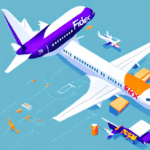Understanding Expedited Shipping
Basics of Expedited Shipping
Expedited shipping is a premium service that prioritizes the speed and urgency of package delivery, ensuring shipments arrive faster than with standard shipping methods. Commonly used for critical documents, perishable goods, or high-value items, expedited shipping typically delivers within one to three business days, depending on the carrier and destination. For example, major carriers like UPS Express Services and FedEx Priority Overnight offer various expedited options to meet diverse shipping needs.
How It Differs from Standard Shipping
Unlike standard shipping, which can take several days to a week or more, expedited shipping provides faster delivery times by prioritizing packages within the carrier’s network. This means that expedited packages are handled with priority, reducing transit times and often including enhanced features such as detailed tracking and higher insurance coverage. According to industry reports, expedited shipping can reduce delivery times by up to 50% compared to standard shipping, making it ideal for time-sensitive deliveries.
Common Misconceptions About Expedited Shipping
One common misconception is that expedited shipping guarantees overnight delivery. While some carriers offer next-day delivery options, expedited shipping generally refers to faster delivery than standard, which can range from one to three days depending on the service chosen. Additionally, expedited shipping is often more costly, but it's not exclusively for high-value items; it can also be beneficial for businesses requiring quick turnaround times for inventory replenishment or customer orders.
Benefits of Expedited Shipping
Advantages for Businesses
For businesses, offering expedited shipping can significantly enhance customer satisfaction by providing quicker delivery times, which in turn can lead to increased sales and customer loyalty. In competitive industries like e-commerce and healthcare, expedited shipping options can differentiate a business from its competitors. According to a Statista report, businesses that offer expedited shipping options often see higher customer retention rates due to the improved delivery experience.
Meeting Tight Deadlines
Expedited shipping is crucial for meeting tight deadlines, especially in scenarios such as preparing for a conference presentation or fulfilling last-minute orders. By choosing expedited shipping, businesses can ensure that essential materials, products, or components arrive on time, thus avoiding delays that could impact project timelines or sales. This reliability is critical in maintaining operational efficiency and customer trust.
Real-Life Success Stories
Several companies have leveraged expedited shipping to their advantage. For instance, Amazon Prime’s expedited shipping options have been pivotal in building its reputation for fast and reliable delivery, contributing to its market dominance. Similarly, Apple relies on expedited shipping services to ensure that new products are available to customers worldwide on launch dates, maintaining brand prestige and customer satisfaction.
International Expedited Shipping
In a global marketplace, international expedited shipping allows businesses to reach customers worldwide with speed and efficiency. Top carriers like DHL and FedEx provide international expedited services that deliver packages to major global cities within one to three days. This capability enables businesses to expand their customer base internationally while ensuring that delivery times remain competitive and customer expectations are met.
Costs and Value
Cost Analysis: Is Expedited Shipping Worth It?
While expedited shipping is generally more expensive than standard shipping, the value it provides can outweigh the additional costs, especially for high-priority or time-sensitive deliveries. The cost varies based on factors such as distance, package weight, and carrier. For example, shipping a 2-pound package via expedited service with UPS might cost approximately $15, compared to $8 for standard ground shipping. However, the business gains in customer satisfaction and reduced delays often justify the expense.
Choosing the Right Carrier
Selecting the right carrier is essential to balance cost, speed, and reliability when opting for expedited shipping. Major carriers like UPS, FedEx, DHL, and USPS offer a range of expedited services tailored to different needs. It’s important to compare their service offerings, delivery times, tracking capabilities, and insurance options. For example, FedEx is known for its extensive overnight shipping options, while DHL excels in international expedited shipping. Additionally, consider carrier reliability and customer service ratings to ensure consistent performance.
Best Practices for Expedited Shipping
Streamlining Your Shipping Process
To maximize the efficiency of expedited shipping, businesses should implement streamlined shipping processes. Utilizing shipping software can automate tasks such as label printing, carrier selection, and real-time tracking. Automation reduces the likelihood of errors and speeds up the fulfillment process, ensuring that expedited shipments are handled swiftly and accurately.
Packaging and Labeling Best Practices
Proper packaging and labeling are critical to ensuring that expedited shipments arrive safely and on time. Use sturdy, appropriately sized boxes or envelopes, and include cushioning materials like bubble wrap or packing peanuts for fragile items. Clearly label packages with accurate recipient information, including tracking numbers, to facilitate efficient sorting and delivery. Applying best practices in packaging minimizes the risk of damage and delays, enhancing the overall expedited shipping experience.
Tracking Expedited Shipments
Effective tracking is a cornerstone of expedited shipping. Most carriers offer advanced tracking tools that provide real-time updates on shipment status, expected delivery times, and any potential issues. Implementing tracking systems allows both businesses and customers to monitor shipments closely, ensuring transparency and allowing for proactive management of any delays. Features like signature confirmation further enhance security and accountability for expedited deliveries.
The Future of Expedited Shipping
Trends and Predictions
Expedited shipping is poised to evolve with advancements in technology and changing consumer expectations. Emerging trends include increased use of automation and robotics in sorting facilities, the development of drone and autonomous vehicle deliveries, and the integration of artificial intelligence to optimize routing and delivery schedules. Additionally, the continued growth of e-commerce is driving demand for faster delivery options, pushing carriers to innovate and expand their expedited shipping services to meet consumer expectations for speed and reliability.
Conclusion
Expedited shipping offers essential benefits for both businesses and individuals by providing faster delivery times, enhanced tracking and insurance options, and improved customer satisfaction. By understanding the fundamentals of expedited shipping, evaluating its costs and benefits, selecting the appropriate carrier, and implementing best practices in shipping processes, businesses can effectively leverage expedited shipping to meet tight deadlines, expand their reach, and maintain a competitive edge. Whether it’s delivering critical documents, high-value goods, or time-sensitive products, expedited shipping can play a pivotal role in ensuring timely and secure deliveries.




















